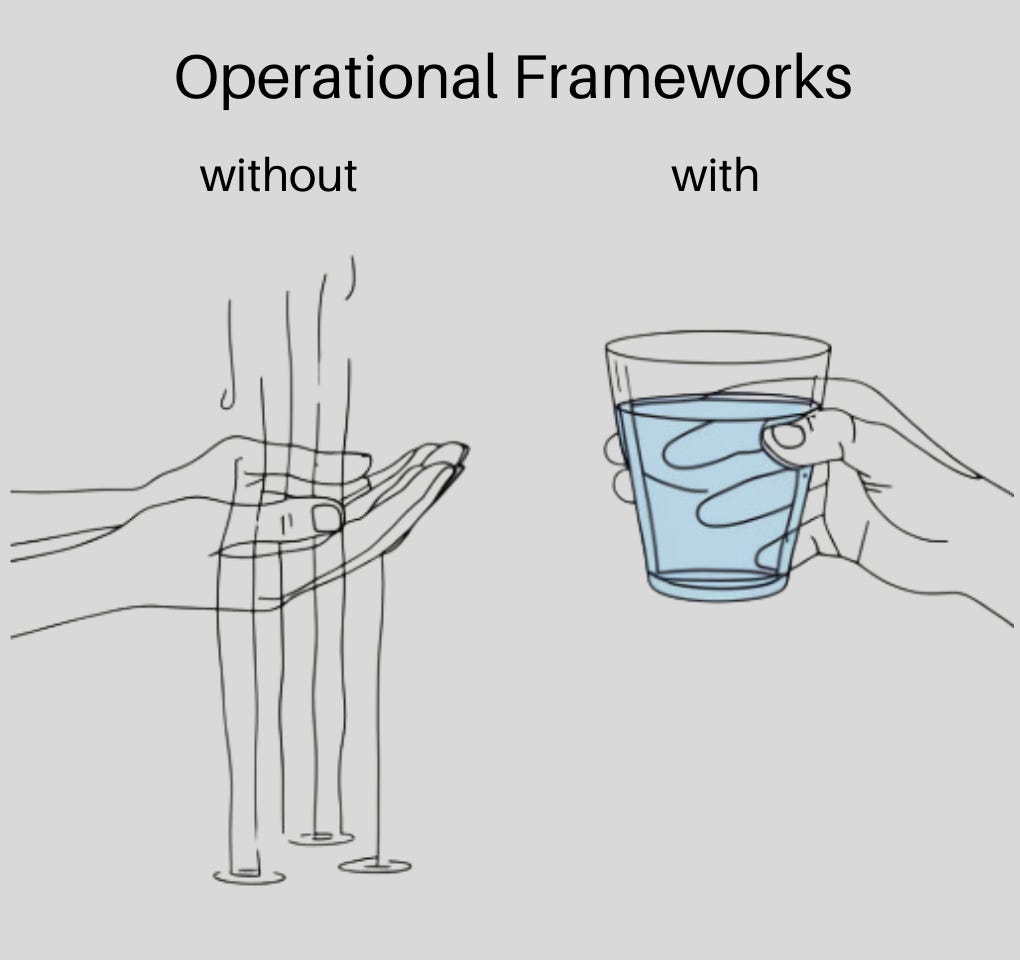Operational Frameworks
WTF does that actually mean, why should you care, and how to take action…
Imagine trying to build a skyscraper without a blueprint. You might get a few floors up, but eventually, the lack of any detailed design or framework will cause the entire building to collapse. 🏗️
The same principle applies to businesses as they grow.
You’ve got a vision for your business, but without the right framing, your skyscraper will never make it beyond the first floor. 😕
Don't let your company become another cautionary tale. Savvy CEOs use operational frameworks to transform their businesses from chaotic startups into streamlined, scalable enterprises. Whether you're battling growing pains or preparing for your next phase of expansion, understanding the power of operational frameworks could be the difference between scaling or collapse.
In the early stages of a business, agility and flexibility are prioritized over formal processes and structures, and that makes sense! However, things change and as a company grows, and the absence of well-defined operational frameworks can lead to inefficiencies, bottlenecks, and potentially, collapse. Understanding when and how to implement operational frameworks is crucial for sustainable growth.
So here, we dive deep into the mystical world of operational frameworks. Ah yes, that place where buzzwords like “synergy,” “operational efficiency,” and “structure alignment” mix up like an IKEA bookshelf—it's all fun and games until you realize you're knee-deep in hex keys and existential dread, wondering if you should've just paid for the assembly service.
Simply put, operational frameworks are the systems, processes, and methodologies that guide how a company functions on a daily basis. They are a structured approach to planning and organizing the resources necessary to achieve specific goals and deliver value to customers. The blueprint for your business that helps put your grand ideas into action.
Think of them as the IKEA instructions for assembling your business. Without them, you're just a grown adult sitting on the floor surrounded by oddly-shaped pieces of confusion and a sinking feeling of inadequacy. And let's be honest, no one wants to end their day filled with existential dread, holding an Allen wrench and a half-constructed shelf named Blörg.
Companies that excel in their operations often outperform their competitors by delivering products and services faster, at a lower cost, and with higher quality. The right operational frameworks can be the difference between a company that thrives and one that merely survives.
The challenge arises when businesses neglect the necessity of maintaining and evolving their operational frameworks as they grow, leading to confusion, inefficiencies, and even existential crises among team members. Because, let’s face it, we all need a little help making sure our metaphorical IKEA shelves don’t collapse under the weight of our existential dread…or actual office supplies.
Inflection points during phases of growth are inevitable.
Operational frameworks can help you to stay ahead.
The Role of Operational Frameworks in Small Companies
From DIY Disaster to Structured Success: Get Your Framework Right!
You see, companies don't start with anyone pondering through how they want to operate. The focus is typically on immediate survival: securing clients, delivering products, and navigating the daily challenges inherent to new ventures. Everyone wears multiple hats, processes are typically informal, and decisions are often made on the fly.
So this is a tale of time—as the business sees success, and therefore growth, teams expand into larger entities, where the absence of a structured operational framework becomes glaringly apparent. Now, growth can (and usually does) mask inefficiencies, making early-stage triumph a double-edged sword, but it is the inevitable hurdles—whether market shifts, financial downturns, or internal disruptions—that expose the fragility of an ad-hoc approach. Without a considered operational framework, what seemed like a winning strategy can quickly turn chaotic under the pressure of scaling.
Instead of waiting for a crisis to spur a reactionary overhaul, businesses can benefit immensely from proactively establishing some operational frameworks. Doing so not only ensures smoother scaling but also prepares the company to navigate future complexities with agility and resilience.
Action: Document important processes but keep it lightweight. This could be as simple as creating a checklist for onboarding new clients or a basic workflow for product development. Encourage team input, fostering an open-door policy where “Hey, I think we should do this differently” is a welcome statement. Centralize these resources so teams know to use them, and to adapt them as the company grows.
Avoid: The temptation to create overly complex frameworks that could bog down your small team as they become caught up in the details. You don't really know what's going on yet, and that is just fine for now! Things are absolutely going to change, but ignoring the need for future scalability can trap you in a reactive model. Agility is great, but failing to document key processes can lead to inconsistencies and errors as the company grows.
So remember, flexibility is key, but living in chaos isn’t ideal either.
The Importance in Mid-Sized Companies
From IKEA Maze to Operational Gaze: Finding Your Way at Mid-Size
As a company transitions from a small startup to a mid-sized business, the need for more formalized operational frameworks becomes apparent. The company is likely experiencing growth in both revenue and headcount, which introduces new challenges such as maintaining quality, managing resources efficiently, and ensuring consistent customer experiences.
Action: Identify core areas of growth—these are the processes that are critical to your business’s success. It's time to mindfully move these away from manual execution and invest in the technology solutions that can automate and streamline these key operations (such as CRM systems, ERP software, or project management tools). Look for tools that facilitate connection and collaboration across teams. Define clear roles and responsibilities. This helps to avoid duplication of effort and ensures that everyone knows what is expected of them. Focus on communication and training to enable your team to be effective.
Avoid: The temptation to stick with outdated processes simply because “that’s how we’ve always done it.” The flip side of that however, is not to lose site of or dilute your company's core. It is the very thing that defines you after all, and it has brought you into this level of success. Embrace "this is why we do what we do," rather than getting stuck in "this is how we do what we do."
This mid-phase is so full of potential! You've had proven success and still have so many possibilities, but remember—what enabled you to get here, won't get you to where you are going...

Essential in Large Enterprises
Make Sure It Stays Up: Avoiding the Big Business Collapse
For large companies, operational frameworks become even more critical. The complexity of the business has increased, with multiple departments, product lines, and likely global operations. At this scale, inefficiencies can have a significant impact on the bottom line, and the lack of a robust operational framework can lead to collapse.
Action: Implement advanced analytics, because at this stage, data-driven decision-making is crucial. Use tools to monitor key performance indicators (KPIs) and identify areas for improvement. Stay focused on continuous improvement. Although the opportunity to iterate may seem daunting due to higher stakes, operational frameworks cannot remain static. Regularly review and optimize processes, incorporating mechanisms for gathering and acting on employee feedback.
Avoid: Bureaucracy that stifles innovation and agility. Striking the right balance between structure and flexibility in this stage is key for continued success. Prevent silos by centralizing how departments, teams, and individuals view their work in relation to and in support of the company's core goals.
The most effective frameworks provide sufficient structure to ensure consistency and efficiency, while still allowing for flexibility and creativity. As companies grow, the need for some level of formalization becomes inevitable to manage complexity and scale effectively. However, it remains crucial to develop operational frameworks from first principles, rather than allowing long-held beliefs to stagnate operations and stifle potential.
Not only does one-size not fit all, but the same size will not continue to fit any organization over time.

These critical moments in a company’s growth highlight when the current methods no longer suffice, signaling the need for a new approach to continue scaling effectively. For operational frameworks, inflection points always occur when a company transitions from one stage of growth to the next. Still, many businesses struggle to recognize when they’ve reached an inflection point and the need to overhaul their operational frameworks. This lack of recognition can lead to inefficiencies, missed opportunities, and even business failure. Understanding the role of operational frameworks at different stages of growth is essential for navigating these challenges.
You know who didn't act upon the need for an overhaul? Blockbuster. They famously failed to adapt operational framework as digital streaming emerged. Ignoring the need for change was like ignoring the signs on a road that leads straight to a cliff. Spoiler alert: That cliff was Netflix.
Netflix however, started as a DVD rental service with a straightforward operational framework focused on shipping DVDs to customers. As the company transitioned to a streaming model and expanded globally, it needed to overhaul its operational frameworks to manage the complexities of digital content distribution, licensing, and customer service across multiple countries.
Netflix implemented a global content delivery network (CDN) and invested in data analytics to optimize its streaming service. The company also adapted its organizational structure to support its global operations, with regional teams responsible for local content and customer engagement.
Well done, Netflix!
If you're encountering this situation in your organization, don't worry; addressing it is more simple than you might imagine. Not sure where to begin? Head over to ChantelHB.com for a free Operational Assessment.
Anticipate and proactively manage these growth related inflection points, and put some contingency plans in place for those changes in the business environment that are a bit less predictable, such as:
New competitive threats emerging
Changing customer demands and expectations
Technological disruptions in the industry
Economic shifts impacting the market
In Conclusion
Operational frameworks are the backbone of any successful business, providing the structure and processes needed to scale effectively. While they may be less critical in the early stages of a company’s growth, they become increasingly important as the business expands.
Understand the fundamentals of operational frameworks and identify the critical inflection points where they become essential for navigating growth challenges.
Small Companies : Focus on agility and flexibility, with simple, informal frameworks that can evolve as the company grows.
Mid-Sized Companies : Begin to formalize processes, invest in technology, and define clear roles and responsibilities to manage increased complexity.
Large Companies : Implement comprehensive operational frameworks that integrate all aspects of the business, with a focus on continuous improvement and cross-departmental alignment.
As your business grows, don’t wait until your progress is hindered. Start thinking about the operational frameworks you’ll need to scale effectively. Whether you’re a small startup or a mid-sized company on the verge of expansion, take the time to assess your current processes and identify areas where more structure could benefit your business. And if you’re already a large company, ensure that your operational frameworks are continuously evolving to meet the demands of your growing enterprise.

Operational frameworks—the strategies that will unify, motivate, orient, and organize people around a common vision to achieve predefined goals within a set timeframe.
In the end, my friends, fear not! For just like completing that IKEA wardrobe—you know, the one with the extra pieces you’re too afraid to throw away—once you crack the code of these frameworks, you emerge victorious. You’ll be strutting through your office (or your Zoom meetings) like a business aficionado, ready to throw around “vertical integration” at the water cooler. Why? Because you did it. You solved the puzzle. You are now the Grand Master of Operational Frameworks. Well, until the next reorganization, anyway…
On that note, the topic up next is: Organizational Structure
If you found this article helpful, consider increasing your support/subscription for more insights on scaling your business effectively. Have thoughts or experiences to share? Drop a comment below—I’d love to hear how you’re navigating the challenges of growth in your own company!






